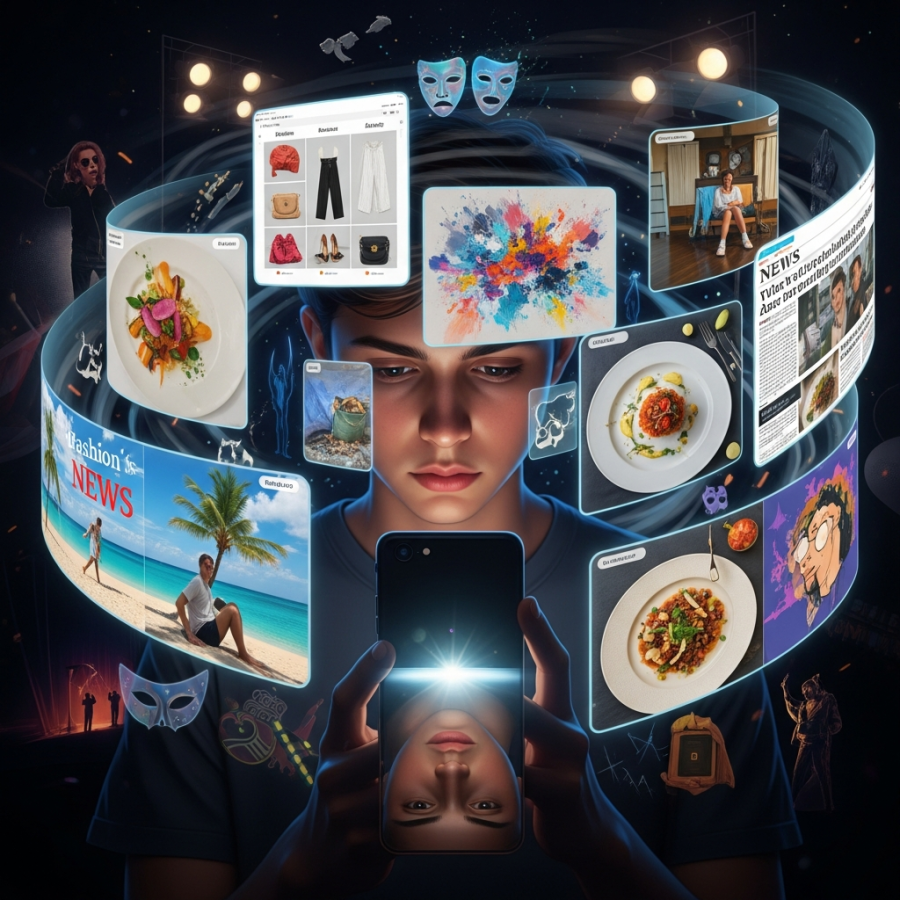There is something about social media that just shifts everything, either in a positive or negative way. Today’s topic is quite interesting: the construction of identity in a digital world.
I remember when I first started using social media, I was 13. I do think that’s such a young age to be online, in a space where anyone can say and do whatever they want. But the positive side of it was that I was in Eritrea, where there was no local or home-based internet, at least back then, there wasn’t any. There was this coffee shop where you could buy internet by the hour, and you’d try to connect through this slow network that most of the time didn’t even work. So, I think when I moved to Italy was when I actually started using it properly, being on my phone 24/7. Now, being part of the Gen Z generation, everyone is on these social media platforms one way or another.
There’s sometimes a self-identity crisis on these platforms because everyone is getting carried away with the amount of content being consumed daily. Unconsciously, we’re all influenced by the media’s idea of an “ideal lifestyle.” My active curation on Instagram, for example, is mostly based on travel or sharing positive messages with my followers. Obviously, I choose the content I want to post, the images, videos, and captions I share are reflective of my personality. I might subconsciously want people to see me as an adventurous person, but I don’t wake up thinking, How am I going to post something today that makes my followers see me in a certain way? It’s more like whatever I share, it’s my own choice.
Yet, I’ve noticed that social media can also create a kind of identity crisis. The amount of content we consume daily can be overwhelming, and whether consciously or not, we are influenced by what the media presents as the “ideal lifestyle.” These images and narratives shape the way we think about ourselves and what we aspire to be.
At the same time, I think digital media is both a place for individuals to express themselves and a site of social influence. Algorithms shape visibility and attention, deciding which types of content and behaviours get noticed.
Reference
Blackboard (2025). Blackboard. [online] Westminster.ac.uk. Available at: https://learning.westminster.ac.uk/ultra/courses/_102764_1/outline/file/_5638594_1 [Accessed 12 Nov. 2025]
Bajwa, Z. (2025). BAJWA: Social media is causing Generation Z to lose their identity. [online] The Daily Targum. Available at: https://www.dailytargum.com/article/bajwa-social-media-is-causing-gen-z-to-lose-their-identity-20250403.
ICTworks. (2014). Understanding Eritrea’s Exceptionally Limited Internet Access. [online] Available at: https://www.ictworks.org/understanding-eritreas-exceptionally-limited-internet-access/.


Your blog shows that you have really got a good grasp on the topic of ‘construction of identity in a digital world’ and with your examples of when you first joined a social media platform where you didn’t have easy access to wifi compared to now when you moved to Italy and you got better access to a wifi source and could access the internet at anytime you wanted. And it is so interesting how you talk about the content thwart you post and view are very similar as you want to be able to show stuff you like through the things you post on your own page and the content that you view made and posted by other people and it is really interesting how you talk about how you don’t actively post things to make your followers think of you in any specific way and how you try and be true to yourself and your personalitiy.
I really enjoyed reading this, thank you for sharing it. The way you describe that shift from the Eritrean coffee shop internet to being “on your phone 24/7” in Italy really stayed with me – it shows how suddenly the digital world can become central to how we see ourselves. I really relate to what you say about curating your Instagram without consciously “planning” an identity. I also post what feels right in the moment, but when I look back, I can see how those choices quietly build a version of “me” that other people read and respond to.
I also feel that blurry line between self-expression and identity crisis you mention. Moving between different cultures and environments, online spaces sometimes felt like the only place where I could choose how to present myself – but at the same time, the constant stream of “ideal lifestyles” made me question whether my life was “enough.” I like that you point out how algorithms are not neutral, how they decide which versions of identity are most visible. It makes me think a lot about how much of “who I am” online is my own choice and how much is gently pushed by what the platform rewards. Your piece makes that tension very visible in a calm, honest way.
This blog weaves Goffman, Marwick & boyd, Turkle and Debord together in a way that feels very natural, not forced – that’s hard to do, and you pull it off. I like how you keep circling back to your own photo-editing habits as an entry point. To deepen it even more, you could add one concrete social media scenario (e.g. finstas, close friends stories, or a specific TikTok “authentic” trend) as a mini case study.